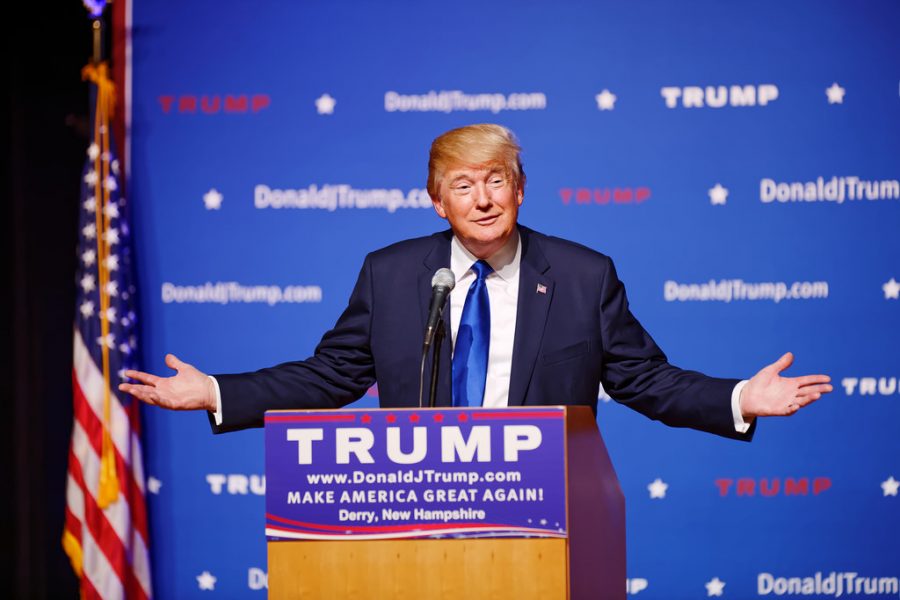 In the 1964 presidential campaign, incumbent Lyndon Johnson ran a controversial television ad against his opponent, Republican Senator Barry Goldwater, which included a nuclear explosion followed by a voice urging to the viewer to vote for Johnson because “the stakes are too high for you to stay home.”
In the 1964 presidential campaign, incumbent Lyndon Johnson ran a controversial television ad against his opponent, Republican Senator Barry Goldwater, which included a nuclear explosion followed by a voice urging to the viewer to vote for Johnson because “the stakes are too high for you to stay home.”
Johnson, ironically, ended up taking the country to war in Vietnam shortly thereafter, but he was able to do so because of his landslide election victory resulting from the fear around his opponent and nuclear weapons in the tensest times of the Cold War.
That election-time fear of nuclear weapons existed only a decade after the end of the Korean War – a three-year period in which the possibility of atomic warfare existed mostly as an afterthought, likely because of the horrific results of dropping atomic bombs on Japan at the end of World War II. Nuclear weapons then were seen as a last resort, for obvious reasons.
The attitudes expressed at that time surrounding nuclear warfare, when the nation was actually at war with Korea, are far from the attitudes expressed now, when North Korean leaders are saying outright that they wish to strike the United States with nuclear weapons. Regardless of its capabilities and rationality, the idea that another country could attack us with nuclear weapons is not being treated delicately on social media and in popular culture, which says a lot about a desensitization of violence in this nation that is amplified in our generation.
For decades, the potential catastrophes of nuclear warfare prevented both the U.S. and the Soviet Union from turning the Cold War into a hot one. American citizens were genuinely fearful when the Soviet Union aimed missiles at them from nearby Cuba in 1962. Now we share memes and tweet jokes mocking North Korea while its Supreme Leader Kim Jong Un says “the moment of explosion is near.”
Many Americans’ overconfidence on this issue likely stems from knowing the size and strength of the U.S. military. It is also likely a product of a generally flippant view of North Korea. It is rooted in popular culture, with new movies like “Olympus Has Fallen” and “G.I. Joe: Retaliation” making awkward references to North Korean villains. The attitude is perpetuated through social media, with memes and cartoons framing the idea that North Korea is just too small to create conflict with the U.S. – thus making it, and nuclear war, something of a joke.
Some memes circulating around the Internet tell Kim to “eat a Snickers” due to irritability. Others imply that the nation does not have the capabilities to even sustain itself. Some jokes go a step further, with one even displaying the poster for the film “Failure to Launch,” with Kim replacing Matthew McConaughey as the star.
A prevailing attitude is that even if North Korea is capable of attacking the U.S., we would be able to stop the strike before impact. This idea of an “American buzzer beater,” however, is something glorified in action movies, not a real life guarantee. No state can be too big to fail, as evidenced by the Roman Empire and the Soviet Union, and being overconfident by laughing and tweeting in the face of violence is not a wise way around fear of the issue. As many as 246,000 people died from the two atomic bombs dropped on Japan at the end of World War II, and the real, detrimental effects of those bombs still exist today. The idea that nuclear weapons, their effects and mass killings are a joke should not be representative of our generation’s attitude toward nuclear threats and diplomacy in general.
Moreover, joking about the impossibility of being attacked with nuclear weapons is incredibly insensitive to those affected by the damage our country wreaked in Japan just 68 years ago.
It’s puzzling how current moods contrast with those of generations prior, especially when we worry so much about Iran and the Middle East despite the threat from North Korea being significantly more direct. A lot of things contribute to our less-than-serious attitude toward this potential international crisis, but the core of the issue is that we have somehow become desensitized and supremely confident in the face of violence.
Maybe, and hopefully, the North Korea threat is not real and Kim is bluffing. But assuming he is when nuclear weapons are in question is dangerous. Sharing a meme mocking North Korea may provide a laugh or two, but it is in our best interest as a generation that will remember this threat the rest of our lives to take it more seriously. The stakes are too high to do otherwise.





Steve Stubblefield • Apr 13, 2013 at 8:49 pm
Japan makes movies about Godzilla being created by the bombs dropped on japan during ww2 and you are worried about our jokes about nukes being insensitive? Are you for real?